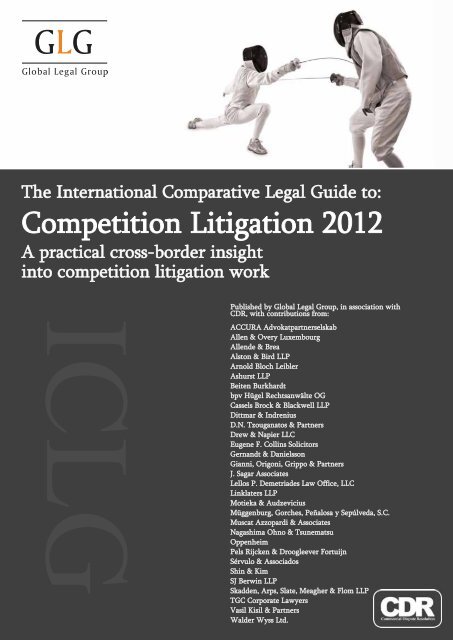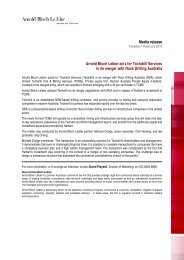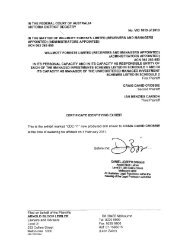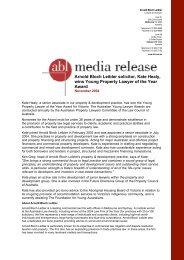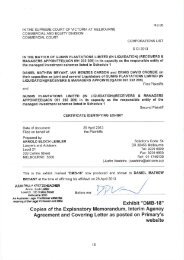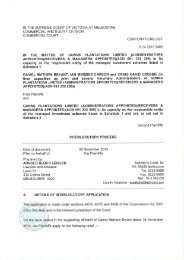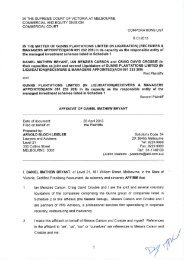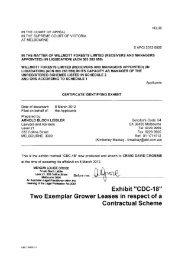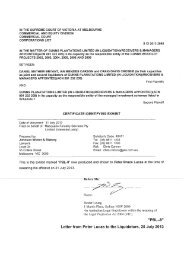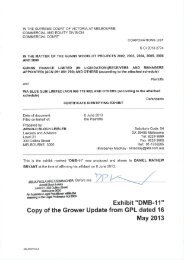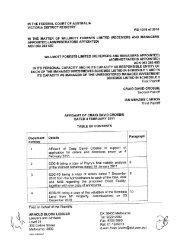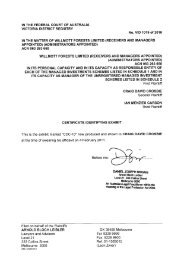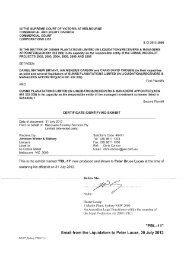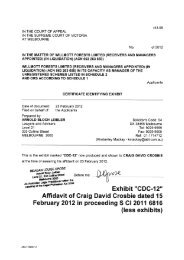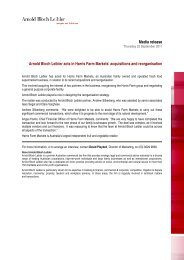Competition Litigation 2012 - Arnold Bloch Leibler
Competition Litigation 2012 - Arnold Bloch Leibler
Competition Litigation 2012 - Arnold Bloch Leibler
- No tags were found...
You also want an ePaper? Increase the reach of your titles
YUMPU automatically turns print PDFs into web optimized ePapers that Google loves.
The International Comparative Legal Guide to:<strong>Competition</strong> <strong>Litigation</strong> <strong>2012</strong>A practical cross-border insightinto competition litigation workICLGPublished by Global Legal Group, in association withCDR, with contributions from:ACCURA AdvokatpartnerselskabAllen & Overy LuxembourgAllende & BreaAlston & Bird LLP<strong>Arnold</strong> <strong>Bloch</strong> <strong>Leibler</strong>Ashurst LLPBeiten Burkhardtbpv Hügel Rechtsanwälte OGCassels Brock & Blackwell LLPDittmar & IndreniusD.N. Tzouganatos & PartnersDrew & Napier LLCEugene F. Collins SolicitorsGernandt & DanielssonGianni, Origoni, Grippo & PartnersJ. Sagar AssociatesLellos P. Demetriades Law Office, LLCLinklaters LLPMotieka & AudzeviciusMüggenburg, Gorches, Peñalosa y Sepúlveda, S.C.Muscat Azzopardi & AssociatesNagashima Ohno & TsunematsuOppenheimPels Rijcken & Droogleever FortuijnSérvulo & AssociadosShin & KimSJ Berwin LLPSkadden, Arps, Slate, Meagher & Flom LLPTGC Corporate LawyersVasil Kisil & PartnersWalder Wyss Ltd.
The International Comparative Legal Guide to: <strong>Competition</strong> <strong>Litigation</strong> <strong>2012</strong>General Chapter:1 The European Commission's White Paper on Damages Actions: The English Experience -Arundel McDougall, James Levy & Lauren Bernard, Ashurst LLP 1Contributing EditorsArundel McDougall &James Levy, Ashurst LLPAccount ManagersMonica Fuertes, DrorLevy, Florjan Osmani,Oliver Smith, Rory Smith,Toni WyattSub EditorsSuzie KiddJodie MablinSenior EditorPenny SmaleManaging EditorAlan FalachDeputy PublisherGeorge ArcherPublisherRichard FirthPublished byGlobal Legal Group Ltd.59 Tanner StreetLondon SE1 3PL, UKTel: +44 20 7367 0720Fax: +44 20 7407 5255Email: info@glgroup.co.ukURL: www.glgroup.co.ukGLG Cover DesignF&F Studio DesignGLG Cover Image SourceiStockphotoPrinted byAshford Colour Press LtdSeptember 2011Copyright © 2011Global Legal Group Ltd.All rights reservedNo photocopyingISBN 978-1-908070-07-4ISSN 1757-2819Country Question and Answer Chapters:2 Argentina Allende & Brea: Julián Peña & Federico Rossi 113 Australia <strong>Arnold</strong> <strong>Bloch</strong> <strong>Leibler</strong>: Zaven Mardirossian & Matthew Lees 154 Austria bpv Hügel Rechtsanwälte OG: Astrid Ablasser-Neuhuber & Florian Neumayr 215 Belgium Linklaters LLP: Françoise Lefèvre & Xavier Taton 276 Canada Cassels Brock & Blackwell LLP: Chris Hersh & Imran Ahmad 327 Cyprus Lellos P. Demetriades Law Office, LLC: Olga Georgiades 388 Denmark ACCURA Advokatpartnerselskab: Jesper Fabricius & Christina Heiberg-Grevy 439 England & Wales Ashurst LLP: Arundel McDougall & James Levy 4810 European Union Skadden, Arps, Slate, Meagher & Flom LLP: Ingrid Vandenborre &Nikolaos M. Peristerakis 5711 Finland Dittmar & Indrenius: Hanna Laurila & Toni Kalliokoski 6312 France SJ Berwin LLP: Marc Lévy & Natasha Tardif 6913 Germany Beiten Burkhardt: Philipp Cotta & Dr. Holger Peres 7514 Greece D.N. Tzouganatos & Partners: Stamatis Drakakakis 8015 Hungary Oppenheim: Gábor Fejes & Zoltán Marosi 8516 India J. Sagar Associates: Amitabh Kumar & Mansoor Ali Shoket 9117 Ireland Eugene F. Collins Solicitors: Joanne Finn & Ronan O’Neill 9618 Italy Gianni, Origoni, Grippo & Partners: Piero Fattori & Michele Carpagnano 10219 Japan Nagashima Ohno & Tsunematsu: Eriko Watanabe & Koki Yanagisawa 10820 Korea Shin & Kim: Hyun Ah Kim & John Hyouk Choi 11421 Lithuania Motieka & Audzevicius: Ramūnas Audzevičius & Tomas Samulevičius 11922 Luxembourg Allen & Overy Luxembourg: Gabriel Bleser 12523 Malta Muscat Azzopardi & Associates: Dr. Clayton Fenech & Lynne Satariano 12924 Mexico Müggenburg, Gorches, Peñalosa y Sepúlveda, S.C.: Esteban Gorches& Alfonso Sepúlveda 13325 Netherlands Pels Rijcken & Droogleever Fortuijn: Berend Jan Drijber &Willem Heemskerk 13926 Poland TGC Corporate Lawyers: Beata Ordowska & Adam Dękierowski 14427 Portugal Sérvulo & Associados: Miguel Gorjão-Henriques & Miguel Sousa Ferro 14928 Singapore Drew & Napier LLC: Cavinder Bull S.C. & Scott Clements 15529 Slovakia TGC Corporate Lawyers: Christian Fielding & Kristína Sýkorová 16130 Spain SJ Berwin LLP: Ramón García Gallardo & Manuel Bermúdez Caballero 16531 Sweden Gernandt & Danielsson: Ola Wiklund & Rolf Larsson 17332 Switzerland Walder Wyss Ltd.: Reto Jacobs & Gion Giger 17733 Ukraine Vasil Kisil & Partners: Oleksiy Filatov & Oleksandr Mamunya 18234 USA Alston & Bird LLP: Adam J. Biegel & Donald M. Houser 187Further copies of this book and others in the series can be ordered from the publisher. Please call +44 20 7367 0720DisclaimerThis publication is for general information purposes only. It does not purport to provide comprehensive full legal or other advice.Global Legal Group Ltd. and the contributors accept no responsibility for losses that may arise from reliance upon information contained in this publication.This publication is intended to give an indication of legal issues upon which you may need advice. Full legal advice should be taken from a qualifiedprofessional when dealing with specific situations.www.ICLG.co.uk
Chapter 3AustraliaZaven Mardirossian<strong>Arnold</strong> <strong>Bloch</strong> <strong>Leibler</strong>Matthew Lees1 General1.1 Please identify the scope of claims that may be brought inAustralia for breach of competition law.A wide range of claims may be brought for breach of competitionlaw under the <strong>Competition</strong> and Consumer Act 2010 (Cth) (“Act”).Prior to 1 January 2011, the Act was named the Trade Practices Act1974 (Cth).The principal prohibitions against anticompetitive conduct are setout in Part IV of the Act:(a) “Cartel conduct”, which involves entering into or givingeffect to a contract, arrangement or understanding (“CAU”)that is between competitors and that includes a “cartelprovision”. There are four types of cartel provisions (section44ZZRD):(i) price-fixing;(ii) restricting outputs in the production and supply chain;(iii) allocating customers, suppliers or territories (marketsharing); and(iv) bid-rigging.(b) Entering into or giving effect to a CAU between competitorsthat includes an “exclusionary provision” – a provision thathas the purpose of preventing, restricting or limiting thesupply or acquisition of goods or services by any of thecompetitors (section 4D).(c) A broad prohibition against entering into or giving effect toany CAU that has the purpose, effect or likely effect ofsubstantially lessening competition in a market (section 45).(d) “Secondary boycotts”, which involve, among other elements,two or more persons acting in concert to hinder or preventthe supply of goods or services (sections 45D, 45DA and45DB).(e) “Misuse of market power” – a firm with a substantial degreeof market power taking advantage of that power for thepurpose of eliminating, deterring or substantially damaging acompetitor (section 46(1)).(f) “Predatory pricing” – supplying goods or services for asustained period at a price that is less than the “relevant cost”to the supplier in order to eliminate, deter or substantiallydamage a competitor (section 46(1AAA)).(g) “Exclusive dealing”, which covers a wide range ofrestrictions on the supplier or acquirer of goods or services –such as not supplying/acquiring goods or services to/fromothers or to particular places (section 47). Except for “thirdline forcing” (see below), exclusive dealing is onlyprohibited if it has the purpose, effect or likely effect ofsubstantially lessening competition.ICLG TO: COMPETITION LITIGATION <strong>2012</strong>© Published and reproduced with kind permission by Global Legal Group Ltd, London(h) “Third line forcing”, which involves a supplier supplying oroffering to supply goods or services on the condition that theacquirer also acquires other goods or services from anunrelated third party (section 47(6)–(7)).(i) “Resale price maintenance” (section 48), which involves asupplier attempting to induce an acquirer not to resupply thesuppliers’ goods or services for less than a price specified bythe supplier (sections 96 and 96A).(j) Anticompetitive mergers and acquisitions – that is, anyacquisition of shares or assets with the effect or likely effectof substantially lessening competition (section 50).Some exceptions to these prohibitions are discussed in question 5.1.Cartel conduct can be prosecuted as either a criminal offence or acivil contravention. The other prohibitions are civil. However, theAustralian <strong>Competition</strong> and Consumer Commission (“ACCC”),which is the government competition regulator, can seek pecuniarypenalties for civil contraventions (see question 3.1).In addition, the Act includes regimes for:(a) access to essential facilities (Part IIIA);(b) the energy industry (Part IIIAA);(c) the telecommunications industry (Parts XIB and XIC);(d) international liner cargo shipping (Part X); and(e) prices surveillance (Part VIIA).An explanation of these regimes is beyond the scope of this chapter.There is also a common law doctrine that a contractual restraint oftrade is void unless it is reasonable in the parties’ interests and in thepublic interest (Buckley v Tutty (1971) 125 CLR 353). This doctrineis commonly invoked in cases concerning the validity of postemploymentcontractual restraints, and is also beyond the scope ofthis chapter.1.2 What is the legal basis for bringing an action for breach ofcompetition law?The ACCC and private parties may apply to the court under Part VIof the Act for various remedies (see question 3.1).1.3 Is the legal basis for competition law claims derived frominternational, national or regional law?The Act is a statute passed by the Parliament of the Commonwealthof Australia. Due to constitutional limitations on theCommonwealth Parliament’s legislative power, the StateParliaments have all legislated to give Part IV a broader application,thus creating the “<strong>Competition</strong> Code”.WWW.ICLG.CO.UK15
<strong>Arnold</strong> <strong>Bloch</strong> <strong>Leibler</strong>AustraliaAustralia1.4 Are there specialist courts in Australia to whichcompetition law cases are assigned?The Federal Court of Australia (“Federal Court”) has jurisdictionto hear all matters arising under Part IV of the Act (section 86(1))and under the <strong>Competition</strong> Code (section 150D). There is a panelof judges (currently numbering 11) who hear competition lawmatters. The rules governing procedure in the Federal Court (the“Federal Court Rules”) were revised in 2011.An accused being criminally prosecuted for cartel conduct has aconstitutional right to a jury trial (Australian Constitution, section 80).The Federal Magistrates Court (a lower court) may hear misuse ofmarket power cases (section 86(1A)) but cannot award damagesgreater than A$750,000 (section 86AA). As this jurisdiction isseverely limited, proceedings in the Federal Magistrates Court arenot considered further in this chapter.The Australian <strong>Competition</strong> Tribunal (“Tribunal”) is a specialisttribunal. It can authorise a proposed acquisition of shares or assetsthat would otherwise breach section 50 (section 95AT) if theacquisition would result in a public benefit such that the acquisitionshould be allowed (section 95AZH). The Tribunal can also reviewthe ACCC’s decisions whether to authorise anticompetitive conduct(see question 5.1).same or similar circumstances and give rise to a substantialcommon issue of law or fact (section 33C). One person maycommence a representative proceeding on behalf of others – evenwithout obtaining their consent (section 33E) – but they have a rightto opt-out (section 33J).1.6 What jurisdictional factors will determine whether a courtis entitled to take on a competition law claim?Part IV of the Act applies to conduct that occurs within Australia. Italso applies to conduct that occurs outside Australia committed bya body corporate incorporated or carrying on business in Australia,or by an Australian citizen or resident (section 5(1)).Further, there are specific provisions concerning misuse of marketpower in a “trans-Tasman” (Australia and/or New Zealand) market(section 46A) and mergers and acquisitions that occur outsideAustralia, but affect competition in Australia (section 50A).The prohibitions on exclusive dealing (including third line forcing)and resale price maintenance also extend to conduct that occursoutside Australia in relation to the supply of goods or serviceswithin Australia (section 5(2)).See further question 1.4 regarding the jurisdiction of the FederalCourt and the Federal Magistrates Court.161.5 Who has standing to bring an action for breach ofcompetition law and what are the available mechanismsfor multiple claimants? For instance, is there a possibilityof collective claims, class actions, actions byrepresentative bodies or any other form of public interestlitigation?Standing depends on the particular penalties or remedies beingsought:(a) Criminal prosecutions for cartel conduct are carried out bythe Commonwealth Director of Public Prosecutions (“DPP”)in conjunction with the ACCC.(b) Only the ACCC can seek a pecuniary penalty for civilcontraventions (section 76).(c) The ACCC or any person may apply for an injunction(section 80), except only the ACCC can do so to restrain ananticompetitive merger or acquisition (section 80(1A)).(d) The ACCC or any other person may apply for a divestitureorder in respect of an anticompetitive merger or acquisition(section 81).(e) Damages can be claimed by any person who suffered loss ordamage as a result of the breach (section 82).(f) The ACCC and/or the DPP can apply for:(i) a “non-punitive order” (section 86C);(ii) an “adverse publicity order” (section 86D); and/or(iii) an order disqualifying a person from managingcorporations (section 86E).(g) A wide range of compensation orders (under section 87) mayalso be sought:(i) by a person who suffers (or is likely to suffer) loss ordamage;(ii) by the ACCC on behalf of one or more such persons(with their prior written consent); or(iii) in any proceeding for a remedy under Part VI.These remedies are explained in question 3.1.Class actions (officially, “representative proceedings”) may bebrought under Part IVA of the Federal Court of Australia Act 1976(Cth) (“Federal Court Act”). This requires at least seven personswho have claims that are against the same person, arise out of the1.7 Is the judicial process adversarial or inquisitorial?The judicial process is adversarial but the Federal Court has broadcase management powers (Federal Court Act, section 37P).2 Interim Remedies2.1 Are interim remedies available in competition law cases?Yes, see question 2.2.2.2 What interim remedies are available and under whatconditions will a court grant them?The court can grant an interim injunction (section 80(2)), whichmay be prohibitory (prohibiting something from being done) or,less commonly, mandatory (compelling something to be done).To obtain an interim injunction, the plaintiff’s claim must raise aserious question to be tried or be sufficiently likely to succeed (ABCv O’Neill (2006) 227 CLR 57). The court will consider whether the“balance of convenience” favours preserving the status quo. Thecourt may refuse to grant an injunction if the plaintiff delays inmaking the application.A plaintiff (other than the ACCC, the relevant Minister and theDPP: section 80) must also give the “usual undertaking as todamages”. This requires the plaintiff to compensate any partyadversely affected by the interim injunction. The amount ofcompensation is what the court considers just.3 Final Remedies3.1 Please identify the final remedies which may be availableand describe in each case the tests which a court willapply in deciding whether to grant such a remedy.A wide range of final remedies is available under the Act:WWW.ICLG.CO.UKICLG TO: COMPETITION LITIGATION <strong>2012</strong>© Published and reproduced with kind permission by Global Legal Group Ltd, London
<strong>Arnold</strong> <strong>Bloch</strong> <strong>Leibler</strong>Australia(a) For individuals involved in criminal cartel conduct, up to 10years’ imprisonment and/or a fine of up to A$220,000 (peroffence) (section 79(1)).(b) For individuals involved in other contraventions (includingcivil cartel contraventions), a pecuniary penalty of up toA$500,000 (per contravention) (section 76(1B)(b)).(c) For corporations, a fine (for criminal cartel conduct undersection 44ZZRF) or a pecuniary penalty (for othercontraventions under section 76(1A)) up to a maximum (peroffence/contravention) of the greatest of:(i) A$10,000,000;(ii) three times the total benefit obtained by thecorporation from the conduct; or(iii) if the court cannot determine that benefit, 10% of theannual turnover of the corporation (and any relatedbodies corporate).(d) An injunction – where a person has engaged, or is proposingto engage, in a contravention (section 80).(e) A divestiture order – where a merger or acquisition hascontravened section 50 (section 81).(f) Damages (section 82) – see further question 3.2.(g) A “non-punitive order” (section 86C), which may require:(i) community service;(ii) that the contravener is put on probation and mustestablish a compliance programme;(iii) disclosure of certain information; or(iv) corrective advertising.(h) An “adverse publicity order” (section 86D). This is apunitive measure, whereas corrective advertising (section86C) is about raising public awareness.(i) Disqualification from managing corporations (section 86E).(j) Section 87 empowers the court to “make such order or ordersas the Court thinks appropriate” against the contravener tocompensate a person who has suffered loss or damage as aresult of the contravention, or to prevent or reduce the loss ordamage. This encompasses:(i) declaring a contract void in whole or part;(ii) varying a contract;(iii) refusing to enforce part of a contract;(iv) directing the return of money;(v) directing the payment of compensation;(vi) directing the repair of goods; and(vii) directing the supply of specified services.(k) Declarations where the court considers it appropriate(section 21 of the Federal Court Act).See question 1.5 regarding which parties may seek these remedies.3.2 If damages are an available remedy, on what bases can acourt determine the amount of the award? Are exemplarydamages available?The amount of damages awarded to a person is the amount of actualloss or damage the person suffered by the contravention (section82). This imports notions of causation and remoteness.Exemplary damages (or “punitive damages”) are not availableunder the Act (Musca v Astle Corp Pty Ltd (1988) 80 ALR 251). Itis not settled whether exemplary damages may be awarded incompetition law cases under section 22 of the Federal Court Act.ICLG TO: COMPETITION LITIGATION <strong>2012</strong>© Published and reproduced with kind permission by Global Legal Group Ltd, London3.3 Are fines imposed by competition authorities taken intoaccount by the court when calculating the award?No, the measure of damage is determined by the loss or damagesuffered by the plaintiff (see question 3.2).An award of damages may indirectly reduce the amount of a fine orpecuniary penalty. To the extent that an award reduces thedefendant’s capacity to pay, the court may take this into account insetting the fine/penalty (ACCC v NW Frozen Foods [1996] ATPR42,435).Further, if a defendant is liable to pay a pecuniary penalty (or fine)and compensation, and has insufficient resources to pay both, thecourt must give preference to the compensation order (section79B(c)).4 Evidence4.1 What is the standard of proof?Apart from criminal cartel proceedings, competition law cases arecivil proceedings. In civil proceedings, a case is proved on thebalance of probabilities (Evidence Act 1995 (Cth) (“Evidence Act”),section 140(1)). However, the court may take into account thegravity of the matters alleged (Briginshaw v Briginshaw (1938) 60CLR 336).In a criminal cartel proceeding, the prosecution must prove its casebeyond reasonable doubt. To the extent required, the defence needonly prove its case on the balance of probabilities (Evidence Act,section 141).4.2 Who bears the evidential burden of proof?The plaintiff bears the burden of proof in civil proceedings.In criminal cartel proceedings, the prosecution bears the burden ofproof but the defendant bears an evidential burden in relation tocertain defences, such as for joint ventures (section 44ZZRO).4.3 Are there limitations on the forms of evidence which maybe put forward by either side? Is expert evidenceaccepted by the courts?The parties may adduce evidence if it is “admissible” – that is,relevant and not excluded under the Evidence Act (section 56).The main exclusionary rules are for:hearsay;opinions;admissions made under duress;character evidence;evidence of judgments and convictions;tendency and coincidence evidence;credibility evidence;identification evidence;client legal privilege; andsettlement negotiations (“without prejudice” privilege).There are exceptions to these exclusionary rules. For example,there is an exception to the opinion rule for expert opinions (section79). The expert opinion must be wholly or substantially based onspecialised knowledge based on training, study or experience.Further, under a mandatory code of conduct, an expert has a duty tothe court and must not act as an advocate for a party.WWW.ICLG.CO.UKAustralia17
<strong>Arnold</strong> <strong>Bloch</strong> <strong>Leibler</strong>AustraliaAustraliaThe court also has a general discretion to exclude evidence that is,for example, unfairly prejudicial (sections 135–137).4.4 What are the rules on disclosure? What, if any,documents can be obtained: (i) before proceedings havebegun; (ii) during proceedings from the other party; and(iii) from third parties (including competition authorities)?During a proceeding, each party must ordinarily undertake“discovery”. This involves making available to the other parties alldocuments in a party’s possession, custody or power that arerelevant to the issues in the proceeding (Federal Court Rules, Part20). Documents subject to client legal privilege or “withoutprejudice” privilege are excluded.Persons who are not parties to the proceeding may be compelled toproduce documents pursuant to a subpoena. A subpoena must not beissued without leave of the court (Rule 24.01). Less commonly, a thirdparty may be ordered to make “non-party discovery” (Rule 20.23).Before proceedings have begun, a person may apply to the FederalCourt for an order for “preliminary discovery” by another person.This may be sought to (i) ascertain the identity of a prospectivedefendant, or (ii) obtain information to decide whether tocommence proceedings (Division 7.3).There are protections, however, for confidential information givento the ACCC about cartel conduct (“protected cartel information”).The ACCC cannot be required to disclose such information:by preliminary or non-party discovery (Act, section 157C); orotherwise (for example, by subpoena) except with the court’sleave (section 157B).If the information was given to the ACCC by an informant, thecourt must take into account that disclosure may discourageinformants in the future.In some circumstances, documents may be obtained from theACCC under the Freedom of Information Act 1982 (Cth).4.5 Can witnesses be forced to appear? To what extent, ifany, is cross-examination of witnesses possible?Generally, a witness may be compelled by subpoena to giveevidence in court (Federal Court Rules Rule 24.12). An ACCCofficial cannot, however, be required to disclose “protected cartelinformation” except by leave of the court (see question 4.4).A party is entitled to cross-examine a witness who is called to giveevidence by another party. If the court grants leave, a party mayalso cross-examine a witness who the party called if the witnessgives evidence that is unfavourable to the party, if the witness doesnot make a genuine attempt to give evidence or if the witness hasmade a prior inconsistent statement (Evidence Act, section 38).4.6 Does an infringement decision by a national orinternational competition authority, or an authority fromanother country, have probative value as to liability andenable claimants to pursue follow-on claims for damagesin the courts?4.7 How would courts deal with issues of commercialconfidentiality that may arise in competition proceedings?A party cannot refuse to discover documents merely because theyare confidential. The parties must not, however, use documentsproduced compulsorily for any purpose other than the proceeding.In practice, the lawyers for one party are often given access to theconfidential documents of another party on condition that theyundertake not to disclose the documents to their client.See also question 4.4 regarding “protected cartel information”.5 Justification / Defences5.1 Is a defence of justification/public interest available?There is no general defence of justification or public interest. Thereare, however, important exceptions and an authorisation process.ExceptionsThere are exceptions to most prohibitions in Part IV of the Act,including for:(a) joint ventures (for cartel conduct and exclusionaryprovisions);(b) intellectual property rights;(c) compliance with official standards;(d) the protection of goodwill after the sale of a business; and(e) employment/partnership conditions and post-employment/partnership restrictions.There is also a defence for secondary boycotts with a dominantpurpose relating to working conditions, environmental protection orconsumer protection (section 45DD).AuthorisationThe ACCC can authorise conduct that would otherwise breach PartIV (except for misuse of market power and predatory pricing) if theconduct would result in a public benefit that outweighs theanticompetitive detriment (sections 88 and 90). A party may applyto the Tribunal for review of the ACCC’s decision (except formerger/acquisition decisions) (section 101).The Tribunal can also authorise acquisitions on the basis of publicinterest (see question 1.4).5.2 Is the “passing on defence” available and do indirectpurchasers have legal standing to sue?These issues have not yet been decided by the courts. Becausedamages awards under section 82 of the Act are compensatory, it isarguable that a plaintiff’s damages award should be reduced by theamount of any loss “passed on” to subsequent purchasers, and thatsubsequent purchasers are entitled to damages if they can provecausation and loss.6 Timing18No, but the ACCC is able to authorise conduct that would otherwisebreach the Act (see question 5.1). The Tribunal is also able toauthorise acquisitions that would otherwise breach the Act (seequestion 1.4).If a court finds that a person breached Part IV of the Act, a findingof fact by that court is prima facie evidence in subsequentproceedings (section 83).6.1 Is there a limitation period for bringing a claim for breachof competition law, and if so how long is it and when doesit start to run?There are different limitation periods for differentpenalties/remedies:(a) The ACCC must bring an action for a (civil) pecuniarypenalty within six years of the contravention (section 77(2)).WWW.ICLG.CO.UKICLG TO: COMPETITION LITIGATION <strong>2012</strong>© Published and reproduced with kind permission by Global Legal Group Ltd, London
<strong>Arnold</strong> <strong>Bloch</strong> <strong>Leibler</strong>Australia(b) Actions for damages must be brought within six years afterthe cause of action accrues, which is when damage issuffered (section 82(2)).(c) An application for a divestiture order must be brought withinthree years of the merger (section 81(2)).An application by a private party or the ACCC in a representativecapacity for a compensation order under section 87(1A) must bebrought within six years after the loss or damage was suffered orbecame likely to be suffered, whichever occurred earlier (section87(1CA)).No limitation period applies to proceedings for an injunction(section 80), and a compensation order can also be sought in suchproceedings (section 87(1)).In New South Wales and Victoria, lawyers’ fees may be wholly orpartly conditional upon a successful outcome. Any “uplift fee” thatis conditional upon success must not exceed 25% of the legal costsotherwise payable.8.3 Is third party funding of competition law claims permitted?<strong>Litigation</strong> funding is permitted and no longer prohibited aschamperty and maintenance (Campbells Cash & Carry Pty Ltd vFostif Pty Ltd (2006) 229 CLR 386).9 AppealAustralia6.2 Broadly speaking, how long does a typical breach ofcompetition law claim take to bring to trial and finaljudgment? Is it possible to expedite proceedings?It typically takes about two years from the time a competition lawproceeding is commenced until judgment. It may take several yearsif the matter is particularly large or complex, or if there areinterlocutory disputes or appeals.The Federal Court also has a Fast Track Directions list. In this list,a Scheduling Conference is set down not less than 45 days after thefiling of the application. At the Scheduling Conference, a trial datewill be set down. The trial date will be between two and fivemonths after the Scheduling Conference. These timeframes may beshortened where the matter is urgent.7 Settlement9.1 Can decisions of the court be appealed?A decision at first instance of a single Federal Court judge may beappealed to the Full Court of the Federal Court (three judges).A Full Court decision may only be appealed to the High Court ofAustralia (the highest court in Australia) if the appellant obtains“special leave”. This is generally only granted where the matterinvolves an important question of law or a matter of nationalsignificance.10 Leniency10.1 Is leniency offered by a national competition authority inAustralia? If so, is (a) a successful and (b) anunsuccessful applicant for leniency given immunity fromcivil claims?7.1 Do parties require the permission of the court todiscontinue breach of competition law claims (for exampleif a settlement is reached)?No, except for class action settlements, which require the court’sapproval (Federal Court Act, section 33V).Also, if a settlement involves the court making certain orders, theparties must apply jointly to the court for those orders. This occurswhen the ACCC and defendant agree pecuniary penalties. It isultimately the court’s decision whether to make the orders sought,but courts recognise the desirability of negotiated settlements.8 Costs8.1 Can the claimant/defendant recover its legal costs fromthe unsuccessful party?The usual rule in civil proceedings is that the unsuccessful partymust pay the successful party’s legal costs. However, this is usuallyon a “party and party basis”, which is typically about two-thirds ofthe actual legal costs incurred.There are also costs sanctions against a party who rejects asettlement offer and obtains no better result from judgment.8.2 Are lawyers permitted to act on a contingency fee basis?Under the ACCC’s immunity policy for cartel conduct, the firstcartelist to come forward, make admissions and cooperate with theACCC is (subject to certain other requirements) entitled toimmunity from criminal prosecution and ACCC-initiatedproceedings.Under the ACCC’s cooperation policy for enforcement matters, theACCC will consider granting immunity or, more commonly,leniency to a party who admits its contravention and cooperateswith the ACCC.An applicant (whether successful or not) under the immunity policyor the cooperation policy is not immune from civil claims (exceptby the ACCC if immunity is granted).10.2 Is (a) a successful and (b) an unsuccessful applicant forleniency permitted to withhold evidence disclosed by itwhen obtaining leniency in any subsequent courtproceedings?An applicant (whether successful or not) under the immunity policyor the cooperation policy is not permitted, in subsequent courtproceedings, to withhold evidence disclosed in the applicationprocess.The ACCC will, however, accept oral applications under theimmunity policy. The ACCC will keep written records but willensure, as far as possible, those records do not prejudice theapplicant.Lawyers in Australia are not permitted to charge “contingency fees”– that is, fees based on a proportion of the money awarded to theclient in the litigation.ICLG TO: COMPETITION LITIGATION <strong>2012</strong>© Published and reproduced with kind permission by Global Legal Group Ltd, LondonWWW.ICLG.CO.UK19
<strong>Arnold</strong> <strong>Bloch</strong> <strong>Leibler</strong>AustraliaAustraliaZaven Mardirossian<strong>Arnold</strong> <strong>Bloch</strong> <strong>Leibler</strong>Level 21, 333 Collins StreetMelbourne, Victoria, 3000AustraliaTel: +61 3 9229 9635Fax: +61 3 9916 9343Email: zmardirossian@abl.com.auURL: www.abl.com.auZaven is an experienced commercial litigator who providesinnovative and strategic advice with a particular focus oncompetition, insolvency and takeover law. Zaven’s clients includeleading organisations in telecommunications, manufacturing,retailing, wholesaling and construction, whom he advises on awide range of competition-related issues, including making orobjecting to merger authorisations and defending or lodgingcomplaints for breaches of the <strong>Competition</strong> and Consumer Act(formerly the Trade Practices Act). Zaven also assists clients todevelop a trade practices compliance programme and deliverstrade practices seminars, for which he has developed acomprehensive plain English trade practices compliance manual.Matthew Lees<strong>Arnold</strong> <strong>Bloch</strong> <strong>Leibler</strong>Level 21, 333 Collins StreetMelbourne, Victoria, 3000AustraliaTel: +61 3 9229 9684Fax: +61 3 9916 9311Email: mlees@abl.com.auURL: www.abl.com.auMatthew Lees is a commercial litigator who advises on a widerange of competition law matters, including price-fixing, marketsharing and other forms of cartel conduct. He acts for companiesand individuals being investigated or prosecuted by the Australian<strong>Competition</strong> and Consumer Commission (ACCC) and in privatecompetition law litigation. He also advises clients on competitionlaw issues arising from mergers, acquisitions and othercommercial agreements, and assists clients to develop their owninternal competition law compliance programme.<strong>Arnold</strong> <strong>Bloch</strong> <strong>Leibler</strong> is a leading Australian commercial law firm that provides strategic legal and commercial advice to some ofAustralia’s largest privately-owned and publicly-listed blue-chip companies, which come to the firm with their most important andsensitive matters. The firm acts for more high net worth individuals and family businesses identified in Business Review Weeklymagazine’s “rich lists” than any other firm, and the firm has a significant overseas-based client base, including individuals,corporations and other leading professional service firms. With offices in Melbourne and Sydney, the firm offers a full range ofcommercial legal services from competition & antitrust, litigation, insolvency, commercial and property to taxation. <strong>Arnold</strong> <strong>Bloch</strong><strong>Leibler</strong>’s competition law department includes department head Zaven Mardirossian and Professor Allan Fels AO, the formerChairman of the Australian <strong>Competition</strong> and Consumer Commission (ACCC).20WWW.ICLG.CO.UKICLG TO: COMPETITION LITIGATION <strong>2012</strong>© Published and reproduced with kind permission by Global Legal Group Ltd, London
The International Comparative Legal Guide to:<strong>Competition</strong> <strong>Litigation</strong> <strong>2012</strong>Other titles in the ICLG series include:Business CrimeCartels & LeniencyClass & Group ActionsCommodities and Trade LawCorporate GovernanceCorporate Recovery & InsolvencyCorporate TaxDominanceEmployment & Labour LawEnforcement of <strong>Competition</strong> LawEnvironment & Climate Change LawGas RegulationInsurance & ReinsuranceInternational Arbitration<strong>Litigation</strong> & Dispute ResolutionMerger ControlMergers & AcquisitionsPatentsPFI / PPP ProjectsPharmaceutical AdvertisingPrivate Client LawProduct LiabilityProject FinancePublic ProcurementReal EstateSecuritisationTelecommunication Laws and RegulationsTrademarksTo order a copy of a publication, please contact:Global Legal Group59 Tanner StreetLondon SE1 3PLUnited KingdomTel: +44 20 7367 0720Fax: +44 20 7407 5255Email: sales@glgroup.co.ukwww.ICLG.co.uk


